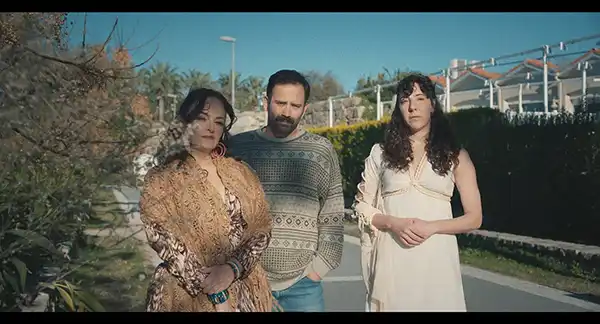Gündüz Apollon Gece Athena (2024): A Mythopoetic Quest Through the Ruins of Identity
Turkish director Emine Yildirim’s debut feature, Gündüz Apollon Gece Athena (2024), is a hauntingly lyrical exploration of fractured lineage and the ghosts of ancient mythology. Premiering at the 15th Beijing International Film Festival’s Tiantan Awards, the film follows Defne (Ezgi Çelik), a disillusioned academic who journeys to the sun-bleached ruins of Side—a once-thriving Greco-Roman port city on Turkey’s Mediterranean coast—to unravel the mystery of her mother’s abandonment. Blending magical realism with archaeological intrigue, Yildirim crafts a narrative where the boundaries between past and present, rationality and mysticism, dissolve like salt in the Aegean breeze.
The Duality of Gods and Mortals
The film’s title, translating to Daytime Apollo, Nighttime Athena, is more than poetic juxtaposition. Apollo, the god of reason and light, and Athena, the goddess of wisdom and war, embody the dialectical forces shaping Defne’s odyssey. By day, she navigates Side’s colonnaded streets and crumbling temples, interviewing locals whose stories blur history and folklore. A revolutionary-turned-tour-guide speaks of Roman aqueducts as “veins of forgotten empires,” while a sex worker claims her ancestors served as priestesses in Athena’s temple. By night, Defne is drawn into dreamlike encounters with spectral figures—a chorus of women chanting in ancient Greek, a shadowy dancer adorned with owl feathers (Athena’s sacred symbol)—that challenge her academic detachment.
Yildirim’s script cleverly mirrors Side’s layered history. The city itself, once a sanctuary for Apollo and Athena, becomes a character: its Hellenistic theater hosts a surreal puppet show reenacting Defne’s childhood, while the Temple of Apollo’s moonlit columns frame her tearful confession to a stray cat. This interplay of sacred and mundane reflects Turkey’s own cultural schizophrenia, where Greco-Roman ruins coexist uneasily with modern resorts—a tension underscored by dissonant sound design blending muezzin calls and electronic dance music.
Feminine Archetypes and the Weight of Silence
Defne’s quest is less about finding her mother than reclaiming erased narratives. Her mother, revealed through fragmented flashbacks, was an archaeologist ostracized for theorizing that Side’s priestesses practiced proto-feminist rituals subverting patriarchal norms. Yildirim visualizes these theories in vivid tableaux: women burning olive leaves in Apollo’s temple, their bodies painted with constellations; a clandestine midnight ceremony where Athena’s statue “speaks” through wind whistling through her hollow eyes. These sequences, shot on 16mm film with a grainy texture reminiscent of 1970s avant-garde cinema, contrast sharply with the sterile digital footage of Defne’s university lectures—a critique of institutional gatekeeping.
The film’s most audacious gambit lies in its gender-fluid casting. Gizem Bilgen, a non-binary actor, plays the enigmatic “Keeper of the Port,” a figure who guides Defne through Side’s underworld. Their androgynous presence—echoing Athena’s warrior-priestess duality—subverts Turkey’s conservative gender norms, while their dialogue (“Gods die when their stories are untold”) resonates as a manifesto for queer resilience.
Cinematic Language: Light as a Narrative Device
Cinematographer Deniz Eyüboğlu employs chiaroscuro lighting to map Defne’s psyche. Apollo’s harsh midday sun exposes Side’s tourist kitsch: neon-clad camels posing beside Corinthian capitals, children selling plastic laurel wreaths. But as twilight falls, Athena’s silvery moonlight transforms the ruins into a liminal space where time collapses. In one hypnotic sequence, Defne stumbles upon a nocturnal market where vendors trade Roman coins for smartphone chargers—an apt metaphor for Turkey’s struggle to reconcile its Ottoman-Byzantine heritage with 21st-century globalization.
The camera often lingers on textures: cracked mosaics mirroring Defne’s fractured identity, the sweat-drenched pages of her mother’s journals, the rough hands of a fisherman who becomes her reluctant ally. These tactile details anchor the film’s metaphysical themes in corporeal reality, a technique reminiscent of Andrei Tarkovsky’s Stalker but infused with distinctly Anatolian sensuality.
Cultural Reverberations and Festival Reception
Since its Beijing premiere, Gündüz Apollon Gece Athena has ignited debates about post-colonial storytelling. Critics praise its refusal to exoticize Turkey for Western audiences—Defne’s research is funded not by a glamorous NGO but by selling heirloom silverware, a nod to economic precarity in academia. However, some Turkish traditionalists have condemned the film’s “mythological revisionism,” particularly a scene where Defne burns a Quranic verse (a family heirloom) to decipher a Greek inscription on Athena’s altar.

Yet the film’s true power lies in its ambiguity. The final act delivers no tidy revelations about Defne’s mother. Instead, in a thunderstorm at the Temple of Athena, Defne confronts a hallucination of her younger self. They dance atop the ruins, their silhouettes merging with the goddess’s eroded form—a transcendent moment where personal and collective memory become indivisible. As the storm clears, Defne leaves Side carrying not answers but a shard of temple marble, its edges sharp enough to draw blood.
Yildirim’s closing dedication—“For the keepers of unwritten histories”—cements the film as a rallying cry for marginalized voices. At 148 minutes, its pacing may test casual viewers, but patient audiences will find a richly layered tapestry of loss and longing, as timeless as the gods it invokes.